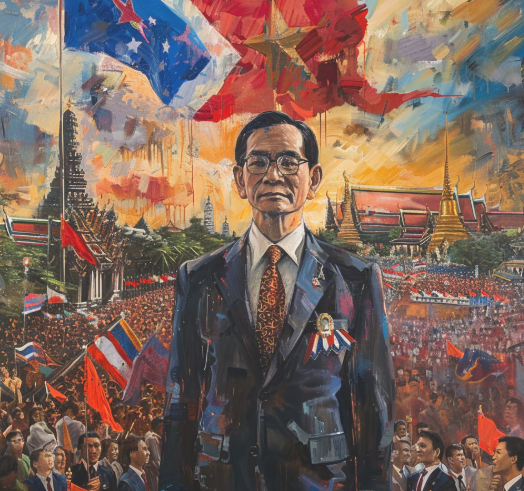
In a week filled with anticipation and heightened curiosity, Thailand’s political landscape is poised for an electrifying moment as Prime Minister Paetongtarn Shinawatra prepares to take center stage. On Thursday, her eagerly awaited public address will cast a spotlight on her administration’s trailblazing achievements over the past three months while unveiling the cornerstone policies set to shape the nation’s future. As the buzz around this event crescendos, Thais are gearing up for what promises to be a pivotal moment in the country’s political narrative.
In a rather innovative twist, the Prime Minister’s address, aptly titled “2025 Empowering Thais: A Real Possibility,” will be simultaneously broadcasted live on NBT2HD and streamed on the state-run TV channel’s Facebook page. The excitement is palpable, with around 500 distinguished guests gathering at the esteemed headquarters of the National Broadcasting Services of Thailand (NBT) on the bustling Vibhavadi Rangsit Road. A who’s who of political heavyweights, including cabinet ministers, departmental heads, provincial governors, military leaders, and more, are set to grace this momentous occasion.
But as the country braces for this significant address, a recent opinion poll by Suan Dusit Poll has painted a vivid picture of what resonates deeply with the Thai populace. The economic challenges wrought by a sluggish global economy have taken center stage, with most Thais eagerly expecting government interventions to alleviate their financial burdens. The findings underscore widespread enthusiasm for more cash handouts and other measures designed to curb everyday living costs, aligning with a time-honored tradition of New Year’s largesse from the government. As Pornpan Buathong, president of the Suan Dusit Poll, aptly encapsulates, these financial footholds are more critical than ever as the economic grip tightens.
The ripple effects of these economic hurdles are manifesting in various facets of daily life. As articulated by Asst Prof Unchalee Rattana from Suan Dusit University, the downturn is shadowing festive cheer, with only a slight majority of respondents (56.02%) expressing intentions to travel during the New Year—a testament to the prevailing cautious consumer sentiment.
In parallel developments, the upcoming political dynamics in Thailand are taking an interesting turn with Minister of the Prime Minister’s Office, Chousak Sirinil, announcing the readiness of the Pheu Thai Party to table a highly anticipated political amnesty bill. This proposed law aims to grant amnesty to individuals embroiled in politically driven legal proceedings from 2005 to the present—a bold move that underscores the administration’s vision of fostering societal reconciliation. Details about the composition of a formal amnesty committee and the specific offenses covered by the bill are still being fine-tuned, promising intriguing times ahead for the legal landscape.
Simultaneously, the constitutional referendum bill is stirring debates and shaping strategies within political circles. The Pheu Thai Party remains steadfast in its resolve, advocating for a simplified majority vote requirement in the Lower House—a move designed to facilitate the bill’s passage amid differing opinions. The bill, previously stalled by Senate rebuttals, will experience a temporary suspension, allowing for reflections and rapprochements towards a harmonious consensus.
House Speaker Wan Muhammad Noor Matha has signaled this energy by convening a trilateral meeting among the government, opposition, and Senate whips to iron out key contentions, potentially setting the stage for establishing a new charter drafting assembly.
Public sentiment around these legislative processes is mixed but reveals intriguing insights. A Nida Poll survey punctuated the delicate balance, with nearly equal proportions of respondents either supporting or dismissing the need for constitutional amendments. However, a significant majority cautiously favoring partial rather than wholesale amendments reflects a nuanced and discerning perspective among the populace as the country navigates this legislative labyrinth.
As Prime Minister Paetongtarn Shinawatra steps into the spotlight, Thais are not just eager but actively engaged, bracing themselves for a roadmap that promises to tread bold paths and inspire new possibilities. Indeed, political theater has never been this captivating, with each upcoming chapter promising a thrilling blend of diplomacy, innovation, and a shared vision of an empowered and resilient Thailand.
Leave a Reply